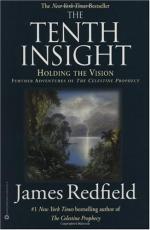
|
| Name: _________________________ | Period: ___________________ |
This test consists of 5 short answer questions, 10 short essay questions, and 1 (of 3) essay topics.
Short Answer Questions
1. What has happened to the man Wil and the narrator see who seems lost?
2. What do Joel and the narrator hear as they see a pair of gray jeeps traveling through the valley?
3. Where does the narrator go when he and Webber part company?
4. In whose dream has Maya appeared?
5. Why does Lipscomb leave?
Short Essay Questions
1. What does Webber intuitively feel as he and the narrator talk and what happens right after that feeling?
2. What does Wil and the narrator realize about where they are and what do they see Joel experiencing?
3. Wwho seems to lead the narrator into the valley, where does he go and what does he do?
4. What does the narrator do first upon waking the next morning, how does he feel and what does he think about his injury?
5. What does Long Eagle say about the valley in Chapter 1?
6. What does Joel say to the narrator about his beliefs?
7. What does Wil tell the narrator about Soul Groups?
8. What does Long Eagle tell the narrator about the valley?
9. What happens in the narrator's initial encounter with Maya?
10. What does the narrator learn in his encounter with Joel Lipscomb?
Essay Topics
Write an essay for ONE of the following topics:
Essay Topic 1
The narration creates a sense of mystery, engaging the reader in the narrator's quest for truth. In this case, there are two different truths - what happened to Charlene, and what is the nature of the Tenth Insight.
1. Explain what you think the above statements mean. Use examples from the text to support your answer.
2. Using just the text from the first chapter, argue whether the search for Charlene is the most important aspect of the story or the nature of the Tenth Insight.
3. Explain what about the sense of mystery in the first chapter goaded you to continue reading the book. Use examples from the text to support your answer.
Essay Topic 2
It's becoming clearer with each passing chapter that, without actually coming out and saying so, perspective is anchored in the concept of destiny - that each individual comes into this existence with a pre-ordained place, purpose and plan. It's also becoming clearer that while the narrative clearly makes the point that that plan doesn't always come to fruition, it also implies that such failure is the result of inability (for whatever reason) to make the choices for the plan to be accomplished ... in other words, because of free will.
1. What do you think the definition of destiny is and why do you think the author is supporting that concept in this book? Use examples from the text to support your answer.
2. Assuming that destiny is true, and that having a vision of what one is to accomplish in life before being born is true but forgotten with birth, explain with examples, why often the purpose of an individual does not come to fruition.
3. Most religions espouse the idea of free will. Those who have no spiritual beliefs would probably agree. Explain the concept of free will, why it might be a law of life and how it seems to manifest in the real world. Use examples to support your answer.
Essay Topic 3
If a story can be likened to a jigsaw puzzle, the construction of a narrative telling that story can be likened to the careful placement of pieces of that puzzle in order to slowly, tantalizingly, and inevitably fill the reader with the desire to see the whole picture. In that sense, the telling of this particular story functions well, with details of meaning, incident, and relationship complimenting and illuminating each other with highly intriguing results.
1. What do you think the first sentence above means? Use examples from the text to support your answer.
2. In view of all the novels you have read or heard about or movies you have seen, explain why leaving readers with a "what happens next" question is universal. Use examples from this book and other books you have read to illustrate this principle and why it is used.
3. Do you believe the second sentence is true? Why or why not? Use examples from the text to support your answer.
|
This section contains 1,248 words (approx. 5 pages at 300 words per page) |

|




